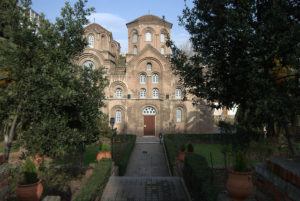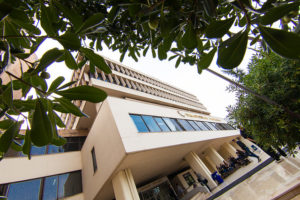
Ioannis Manos, PhD, Assistant Professor, Department of Balkan, Slavic and Oriental Studies, University of Macedonia, Thessaloniki, Greece
Social anthropology is a recently established and developed discipline in most of the countries of Eastern and Southeastern Europe. It has gained status progressively and achieved relative recognition inside academia. The university is the predominant institution for both the transmission of anthropological knowledge, and training in ethnographic research.
As students enrol at the university, they usually have no prior knowledge of what anthropology is and what ethnography means. Most of them develop their perception of otherness in educational systems which are strongly shaped by national ideologies that privilege the superiority of the nation and its history. As a consequence, all efforts to talk about other societies and cultures, different perceptions and ways of human life, distant, or close enough, are confronted, at least at the initial stage, by ideas of ethnocentrism.
 When we teach anthropology in Eastern and Southeastern Europe, we intend to accomplish the following objectives: a) make anthropology appealing as the study of human diversity b) introduce the students to the study of cultural difference c) familiarise them with the ethnographic method as the fundamental mode of production of anthropological knowledge, d) make them transcend their conceptual national boundaries and e) in the current times, produce qualified researchers according to the needs of the job market. Thus, teaching anthropology involves an effort to make them familiar with the study of otherness in unfamiliar and familiar contexts.
When we teach anthropology in Eastern and Southeastern Europe, we intend to accomplish the following objectives: a) make anthropology appealing as the study of human diversity b) introduce the students to the study of cultural difference c) familiarise them with the ethnographic method as the fundamental mode of production of anthropological knowledge, d) make them transcend their conceptual national boundaries and e) in the current times, produce qualified researchers according to the needs of the job market. Thus, teaching anthropology involves an effort to make them familiar with the study of otherness in unfamiliar and familiar contexts.
Α number of students appreciate anthropological thinking as a cultural critique. They are attracted to anthropology because they perceive it as a radical, subversive discourse, which empowers them to question dominant representations of their society and history, and perhaps to understand the processes of their construction and ideological functions. However, their interest in their “own” society is not necessarily accompanied by interest in learning about “other” societies. Assuming that such knowledge is complementary rather than essential to understanding “themselves,” they are content with reducing the relevance of the cross-cultural perspective to anti-ethnocentric principles.
Yet, talking about otherness and turning students’ attention to differences “within” may entail dangers. Namely, it may reinforce reified notions of cultural difference and identity. The idea that refugees and immigrants currently living in these countries are culturally different and that their “otherness” is both observable and problematic is largely viewed as a self-evident truth. Placing themselves within the majority and the “mainstream” of social life, students often assume that the cultural identities of refugees and immigrants, minority or “local” people are more fixed, homogenous, and “authentic” in terms of social practice than their own. In such a context, where current political, social, cultural and economic phenomena affect and transform the lives of the people, teaching anthropology concerns, primarily, the discipline’s potential to present itself and its method as an intervening and engaging force in understanding social reality. This has been a very crucial challenge for an academic context which does not belong to the principal producers of anthropological knowledge.
 These issues are going to be addressed in a conference that will take place in May 12-13, 2018, in Thessaloniki, Greece with the title “Teaching and learning anthropology and ethnography in Eastern and South-eastern Europe: making sense of cultural difference in familiar and unfamiliar contexts”. The contributions are expected to reflect on teaching experiences, and discuss key questions with regard to the production and dissemination of anthropological knowledge in both discipline-related and interdisciplinary, academic and non-academic contexts.
These issues are going to be addressed in a conference that will take place in May 12-13, 2018, in Thessaloniki, Greece with the title “Teaching and learning anthropology and ethnography in Eastern and South-eastern Europe: making sense of cultural difference in familiar and unfamiliar contexts”. The contributions are expected to reflect on teaching experiences, and discuss key questions with regard to the production and dissemination of anthropological knowledge in both discipline-related and interdisciplinary, academic and non-academic contexts.
Ioannis Manos, PhD
Assistant Professor
Department of Balkan, Slavic and Oriental Studies, University of Macedonia, Thessaloniki, Greece
imanos@uom.edu.gr
https://www.flickr.com/photos/128617711@N04/16362042460/in/album-72157650861982101
https://www.flickr.com/photos/128617711@N04/16567240301

Thank you for the interesting post. We are struggling with the concept of the “other” right now in our curriculum, as we respond to the 94 calls to action by the Truth & Reconciliation Commission on Canadian Indigenous peoples. I am specifically trying to address the complicated relationship between anthropologists and Canadian Indigenous populations in my courses as we try to assist them in the de-colonization of post-secondary institutions in Canada. We have a very diverse student population in Toronto and I am working with the UTM Aboriginal Elder to address some of these important issues in Anthropology.